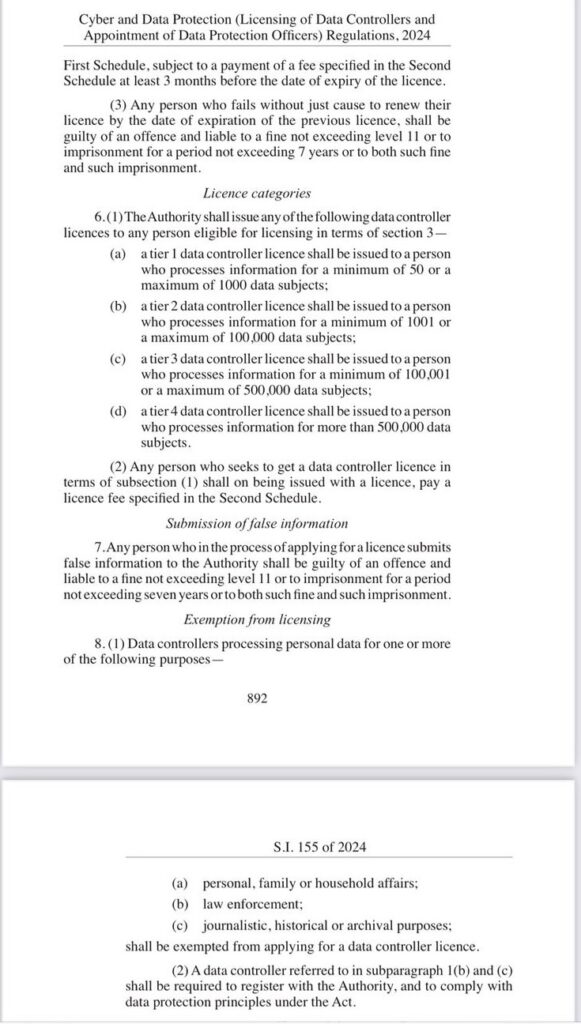Following Zimbabwe’s recent announcement that WhatsApp group administrators for business groups will need licenses and government-certified Data Protection Officers, the public response has been sharp.
Information, Communication Technology (ICT), Postal and Courier Services Minister Tatenda Mavetera’s announcement came after a recent meeting in Harare, signalling the government’s intent to implement the Cyber and Data Protection Act (2022), backed by Statutory Instrument (SI) 155 of 2024.
The Cyber and Data Protection (Licensing of Data Controllers and Appointment of Data Protection Officers) Regulations, 2024, specify that individuals or entities processing personal data for purposes such as determining the means, purpose, or outcome of processing must obtain a license from the Data Protection Authority, the Postal and Telecommunications Regulatory Authority of Zimbabwe (POTRAZ).
Licensing fees vary based on the number of data subjects and exemptions from licensing include processing personal data for personal, family, or household affairs, law enforcement and journalistic, historical, or archival purposes.
These exempted data controllers must still register with the Authority and adhere to data protection principles.

The ICT minister said proposed licensing fees start at $50 and can go up to $2 500 depending on group business, a detail which further fueled the perception that the policy is aimed at revenue rather than security or privacy.
As a result, many citizens view the move as an overreach and a revenue-generating mechanism.
Emmanuel Ndlovu from Emthunzini Suburb questioned the feasibility of such a move, noting, “I do not know what business you will be doing to justify paying $2 500 for merely being an admin.”
He pointed out that WhatsApp itself offers its platform for free, making the added costs perplexing.
Another resident, Witness Dube from Trenance Suburb argued that POTRAZ’s involvement was “poking its nose where it was not supposed to,” suggesting that reducing data costs would be a more helpful policy.
Another resident, commented on the broader issue, saying instead of policies to support businesses, the government has itself become a business.
“The problem is our government instead of creating policies to make sure businesses thrive and make money, therefore employing people and paying taxes has become a business itself,” he said, claiming this is “why most business people now want to be politicians.”
“Solar tax is coming soon, borehole licenses, TV licenses even if you don’t use local frequencies. There is presumptive tax for informal businesses, road levy on fuel, toll gate fees.”
It has also rubbed off local authority, with rates higher than ever, Parking fees, No services but want money. I can fill a page on what they want from people while doing nothing.”
Some residents, like Mr Dubley, see this as an attempt at government censorship.
“This is a simple way of implementing some form of control. WhatsApp will not allow such control,” he said, adding that censorship concerns undermine the independence of Data Protection Officers.
“However, if this Officer now works under the monitor of an outsider then censorship seems to limit his or her operational freedom. In most countries, this is left to the companies and institutions to decide how they appoint their DPO who is responsible for how the company’s employees and company safety is guaranteed.”
Dudley said SI 155 of 2024 “does not control WhatsApp and it makes it clear that the Data Protection Officer reports directly to the Chief Executive Officer of any company or institution to guarantee his or her independence at the workplace.”
He also highlighted the growing shift to alternative services like Starlink for faster, uncensored internet.
“I really fail to fully understand what this minister is trying to achieve because more people are going Starlink’s way avoiding the poor service from his Internet suppliers,” he said.
Others sarcastically referenced the government’s developmental mantra, saying the ICT ministry’s approach left “no one behind” in collecting public money.

